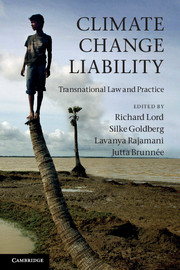Book contents
- Frontmatter
- Contents
- Contributors and Editorial Board members
- Foreword
- Acknowledgements
- Abbreviations
- Part I Legal, scientific and policy aspects
- 1 Introduction
- 2 The scientific basis for climate change liability
- 3 Overview of legal issues relevant to climate change
- 4 Policy considerations
- Part II National laws
- Asia and Pacific
- Africa and the Middle East
- Europe and Eurasia
- North America
- Central and South America
- Selected resources
- Index
- References
1 - Introduction
from Part I - Legal, scientific and policy aspects
Published online by Cambridge University Press: 05 June 2012
- Frontmatter
- Contents
- Contributors and Editorial Board members
- Foreword
- Acknowledgements
- Abbreviations
- Part I Legal, scientific and policy aspects
- 1 Introduction
- 2 The scientific basis for climate change liability
- 3 Overview of legal issues relevant to climate change
- 4 Policy considerations
- Part II National laws
- Asia and Pacific
- Africa and the Middle East
- Europe and Eurasia
- North America
- Central and South America
- Selected resources
- Index
- References
Summary
1.01Climate change presents to society as a whole a wide range of threats, and a narrower range of opportunities, on the political, economic and social level. It also poses questions and challenges for the law. These legal questions and challenges are relevant not just to lawyers; the law affects all members of society to a greater or lesser extent, whether as policymakers, businesspeople, campaigners of all hues or individual citizens. All of these actors are subject to a complex and much disputed matrix of rights and obligations: legal rights and obligations, political and moral rights and obligations, owed by and to individuals, corporations and States, and, in some cases, to future generations. The law is a tool; it may variously be a sword, a shield and the rock on which societies are built.
1.02Climate change itself is multifaceted in many respects; it raises physical, scientific, economic, social, political and cultural issues along with legal ones. The web connecting the various causes and effects of climate change is complex. Possible legal solutions to climate change problems are likewise complex and difficult to classify. They encompass a wide range of international and national law. The law exists to serve society, and has accordingly evolved to meet the changing needs and challenges of society. With climate change, this evolution involves – and will, we believe, increasingly involve – both the application of existing legal concepts, including some ancient doctrines generally seen as dormant if not extinct, to new factual issues, and the development of new legal concepts.
- Type
- Chapter
- Information
- Climate Change LiabilityTransnational Law and Practice, pp. 3 - 7Publisher: Cambridge University PressPrint publication year: 2011



